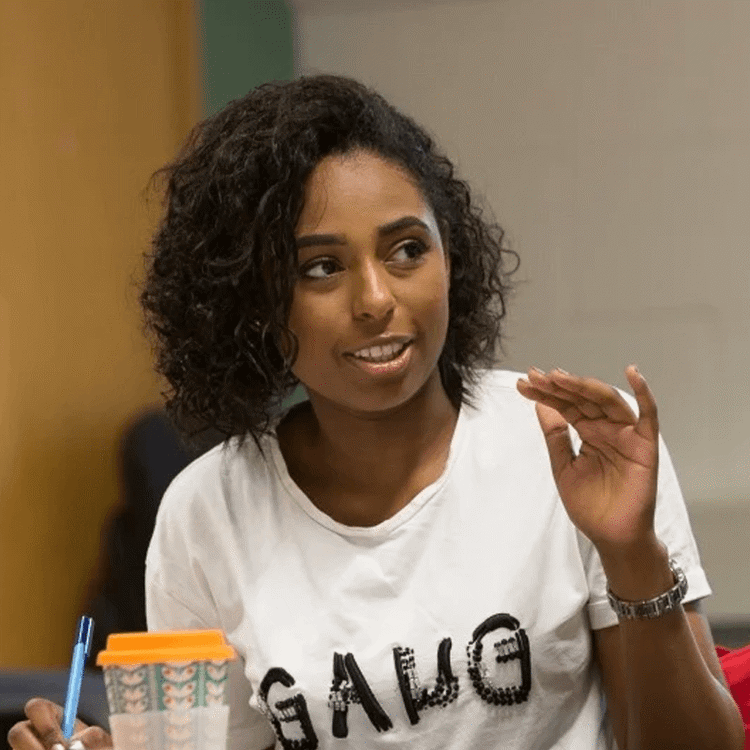/ Undergraduate /
Start date:
September 2025
You'll need:
112–128 UCAS points (or equivalent)
Foundation Year: 64–80 UCAS points (or equivalent)
UCAS codes:
L300
L101 (if choosing Foundation Year)
L301 (CertHE)
L302 (DipHE)

On-Campus Open Day
Saturday 12 July 2025
Set the foundation for an exciting career. Studying Sociology helps you make sense of society and how it's organised. The degree challenges your everyday assumptions about the world and your place in it.
Did you know?
University of Roehampton London is ranked in top 10 universities in London for Sociology (Guardian University Guide 2024).
Top modern university in London in Sociology
(Complete University Guide 2025)

Silver in the 2023 Teaching Excellence Framework (TEF)
For delivering high quality teaching, learning and outcomes for our students.

#1 modern university in the UK for Research
Research Excellence Framework

Foundation Year
This course can also be studied with a foundation year (September entry only).
Modules
Module overview:
This module will support you in your transition into Higher Education by providing you with opportunities to adapt to university and university-level study and approaches.
This will include reflecting on our assumptions, critical thinking and ethical writing, considering the place of AI within university study and exploring ‘social responsibility’.
What make Sociology different to other disciplines? This module serves as an introduction to the scope of sociology - exploring the origins of sociology, sociological theories, and sociological methods – as well as getting you thinking about sociology’s relevance to your own lives and its relevance beyond university study.
This module explores how popular culture reflects and shapes societal values and power dynamics. Through media such as television, music, fashion, and social media, you will explore its role in reinforcing or challenging norms and examine how it can serve as a powerful tool for social and cultural change.
What is activism? How might we campaign for social justice? Through a diverse range of social movements (both local and global), this module considers topics including mobilisation and politics of race, ethnicity and migration; grassroots movements and DIY activism, and online social movements and digital activism.
These modules are those we currently offer and may be subject to change.
This module is designed to introduce the diverse range of perspectives contributing to ‘the sociological imagination’, giving you a taste of the different ways to approach a subject of sociological enquiry. You will think critically about so-called ‘schools of thought’ in sociology in building a fuller understanding of various phenomenon.
This module thinks through the nature of social identities and inequalities, engaging with contemporary real-world issues concerning them. You will investigate how aspects of social identities are shaped, reproduced, and resisted within societal and institutional contexts, exploring topics such as embodied identities, social identities in a globalized world, and identity politics.
This module examines key sociological concepts in urban settings, exploring how cities shape and are shaped by social, cultural, economic, and political forces. You will examine issues like inequality, race, class, urbanization, gentrification, and social movements through sociological theory, case studies, and real-world urban fieldwork.
Module overview:
How can we generate new knowledge and understandings in the Social Sciences?
In this practical module, you will explore the theoretical, ethical, and practical dimensions of the research process and will look at a range of quantitative and qualitative methodologies for collecting and analysing social scientific data.
These modules are those we currently offer and may be subject to change.
This course offers all students the option of a one-year paid work placement, to boost your employability even further. If you choose this route, you will take the placement following year two of your course, and then return to complete your degree.
Why take a placement?
A placement year is the perfect opportunity to gain valuable work experience, to build on the career skills we will teach you on this degree. The connections you make on the placement will improve your career prospects further, and equip you with the skills you need to secure graduate-level employment.
How we support you
The University's Placement and Work Experience Team are experts at helping you to secure a placement. They will work closely with you from the start, helping you research potential employers, discover placement opportunities, create and pitch your CV, and will coach you to perform well in interviews. We aren't able to guarantee a placement, but our sector-leading advisors will give you the best possible chance of securing one.
Find out more about how we'll support you
We understand that your plans might change once you start your programme. If you decide not to do a placement, you will have the option of completing the three year version of your programme.
Whatever your choice, you will have access to many opportunities for work experience through our Placement and Work Experience Team, and access to face-to-face and 24/7 online careers support.
Module overview:
In this module you will design and lead on an independent research project on a subject of your own choice, drawing on your knowledge related to your subject of study and of research methodology and ethics.
This module will explore the relevance of sociology for addressing societal issues/problems across a range of organisations. You will consider a range of practice-relevant issues including homelessness, challenges experienced by families, and human rights violations, hearing from individuals working within relevant institutions/agencies.
Human rights are an important area of social life, and underpin many political, legal, and moral decisions. In this module we will be applying sociological insight to a range of human rights concerns and atrocities, such as torture, genocide, slavery, the death penalty, and the plight of refugees.
Module overview:
Digital technology is increasingly a feature of our lives; from our behaviours as consumers to our day-to-day interactions to our engagement in education.
We’ll explore such issues in this module, looking to ask (and answer) big questions about what this digitality means for individuals, social groups, social structures and society.
Module overview:
You will explore the ways in which family life shapes, and is shaped by, crime and criminal justice processes.
By placing ‘the family’ at the heart of its analysis, this module draws together a range of established criminological topics such as youth justice, interpersonal violence, organised crime, policing, and victimology.
Module overview:
Complete a work placement as part of your degree.
These modules are those we currently offer and may be subject to change.
This course offers a foundation year, which takes place at the beginning of your studies. Studying a foundation year will give you academic and practical experience, and a strong introduction to your subject, ensuring you succeed on your undergraduate degree.
30 credits
You will develop your core academic and integrated English language skills of speaking, listening, reading and writing. You will become familiar with key academic skills and concepts, such as referencing methods and awareness of academic integrity and tone. You will apply these skills and knowledge to both broad topics and also your chosen subject pathway.
Teaching and learning
You will be required to actively engage in on-campus learning for up to 10 hours a week.
You will be taught through a full range of teaching and learning methods, which include lectures, seminars, workshops, discussion groups, group directed tasks and presentations. This will enable you to learn from your peers and tutors in both structured and information settings.
You will be encouraged to think creatively about your approach to learning and discussions with your peers. You will also have access to recordings, resources, links and signposting through Moodle to enrich your learning.
Assessment
You will be assessed through group and individual presentations, comparative and reflective essays, multiple choice exams, coursework and reports, oral exams, portfolios, case studies and blogs.
30 credits
You will develop your research, numeracy and information technology skills. You will investigate the difference between primary and secondary research, conduct your own research project and demonstrate your findings through data analysis. You will also develop your awareness of equality, diversion and inclusion in the UK, through a real-world issue; discrimination in the workplace.
Teaching and learning
You will be required to actively engage in on-campus learning for up to 10 hours a week.
You will be taught through a full range of teaching and learning methods, which include lectures, seminars, workshops, discussion groups, group directed tasks and presentations. This will enable you to learn from your peers and tutors in both structured and information settings.
You will be encouraged to think creatively about your approach to learning and discussions with your peers. You will also have access to recordings, resources, links and signposting through Moodle to enrich your learning.
Assessment
You will be assessed through group and individual presentations, comparative and reflective essays, multiple choice exams, coursework and reports, oral exams, portfolios, case studies and blogs.
30 credits
This module supports a broad exploration of crime and law and its integration within society across various sources, which includes diverse cultural, social, and political representations. By analysing a wide range of topics, you are encouraged to critically engage with how disability, gender and race are represented and viewed in relation to crime and law.
This course integrates sustainability by looking at the sustainability of social interactions and your results and consequences in relation to crime and law. Social responsibility, legal injustice across the globe and inequality are all featured. Social Responsibility is embedded through topics such as social identity, prejudice and exclusion. Social Cognitive Theory and Rational Choice Theory helps you understand challenges and question accountability for individuals and communities.
This course fosters global engagement by examining the inequalities experienced in other cultures, particularly in relation to race, gender and exclusion. Global challenges are addressed at every step equipping you with the skills to navigate a globalised world in a variety of ways. By analysing data and text concerning diverse cultures and contexts, you will develop an understanding of how individuals and cultures operate amongst injustices in a globalised world, preparing you to engage thoughtfully with diverse audiences.
Teaching and learning
Through lectures, workshops, group work, and structured academic writing, you will have the opportunity to practice the core academic skills needed for your future studies. Critical thinking will be developed through tasks such as text analysis, group discussions, and the ability to create well-structured academic assignments, including essays and presentations.
The teaching delivery for each module consists of one, one-three-hour lecture and one, two-hour workshop per week. You will get a diverse learning experience through case studies and active learning workshops and microteaches.
You will also have an additional 30 minutes of online support each week, consisting of activities to develop your presentation skills and to provide you with opportunities to explore wider policy implementation in diverse/comparative transnational examples.
Assessment
This module will be assessed using a video presentation and summative essay.
30% - video presentation, working in groups, you will produce a video on a topic taught on the curriculum and explain its impact on UK society, using a real-world example.
70% - summative essay, you will identify an issue, either historical or contemporary, that has had an impact on UK society and connect it to at least one of the key topics covered in the course.
30 credits
This module supports a broad exploration of social understanding across various sources, which includes diverse cultural, social, and political representations. By analysing a wide range of topics, you are encouraged to critically engage with how disability, gender and race are represented and viewed. This ensures that your projects and research can reflect a variation of perspectives, fostering a more inclusive and holistic learning environment.
This course integrates sustainability by looking at the sustainability of social interactions and your results and consequences. Social responsibility, globalisation and inequality are all featured. Social Responsibility is embedded through topics such as social identity, prejudice and exclusion. Social Cognitive Theory and Rational Choice Theory help you understand challenges and question accountability for individuals and communities.
This course fosters global engagement by examining the inequalities experienced in other cultures, particularly in relation to race, gender and class. Global challenges are addressed at every step, equipping you to navigate a globalised world in a variety of ways. By analysing data and text concerning diverse cultures and contexts, you develop an understanding of how individuals and cultures operate in a globalised world, preparing you to engage thoughtfully with diverse audiences.
Teaching and learning
The teaching delivery for each module consists of one, one-three-hour lecture and one, two-hour seminar per week. Lecturers will cover core indicative content, while seminars will consist of research workshops, as well as forming small groups and learning on relevant case studies.
You will also have an additional 30 minutes of online support each week, consisting of activities to develop your presentation skills and to provide you with opportunities to explore wider policy implementation in diverse/comparative transnational examples.
Assessment
This module will be assessed using an academic poster and a summative essay.
40% - academic poster, you will design a poster that provides key information and sociological analysis of your selected story or issue chosen from key weekly topics.
60% - summative essay, you will conduct a sociological analysis of a story or issue you have encountered in the media.
These modules are those we currently offer and may be subject to change.

Skills
Push yourself further with real-world assignments.
On our BSc Sociology, our priority is ensuring that you graduate with a professional skillset. This incorporates:
- Being equipped with knowledge and skills to understand how people live in society and how individuals can navigate and build positive communities.
- Becoming a sociologist who can make a positive impact in your local and global community.
- Developing research skills that able to you apply sociology in ways that enable you to contribute positively and make changes through social and community activism.
Build essential professional skills like effective communication, presentation techniques, digital skills, and teamwork. Sharpen your ability to understand others, challenge assumptions, and think critically. You'll learn to evaluate evidence, assess different perspectives, and analyze data, empowering you to present compelling ideas with confidence.
Learning
Experience a dynamic, contemporary curriculum in state-of-the-art facilities.
Our modules will offer an innovative suite of assessment types, including:
- Removing exams and replacing them with assessments that focus on knowledge, skills, and achievements.
- Embedding authentic assessment across the programme, particularly through how professional practice is taught and assessed.
- Focusing on portfolio development.
- Incorporating a range of innovative practices such as Campaign Files, Visual Ethnography, Self-Reflective Diaries, Blogs, Vlogs, and conference activities.

Dr Greta Franklin-Brown
Lecturer in sociology. Her research focuses on education and equality, particularly the education achievements of Black Caribbean girls/women (across generations).

Dr Claire Collison
Visiting lecturer in sociology. Research interests in yoga, forced migration, phenomenology, intersectionality, leisure and religion.
Dr Yuwei Lin
A sociologist specialised in science and technology studies. Her recent research interests concentrate on critical data studies, observing the big data, open data, algorithmic cultural phenomenon and related issues such as privacy, surveillance, automated discriminations by artificial intelligence (AI).
Dr Athina Mara
Lecturer in strategy and social policy. Her research focuses on sociology, social policy, gender, sexuality, kinship, migration, (in) equalities, citizenship, and integration in EU societies.

Dr Darren O'Byrne
Reader in sociology and human rights. Human rights specialist whose recent work includes exploring issues of standardisation, quality assurance, intellectual integrity and the importance of human rights understanding in higher education, and on ecocide as a human rights concern.

Professor Philippa Velija
Professor of sociology and AHSS Deputy Dean. Research focuses on understanding social inequalities in sport and leisure, providing a sociological theoretical analysis of inequality and power relations.
Dr Laura Way
Senior lecturer in sociology. Research focuses on ageing and gender; marginalisation and co-development of support; creative and particpatory methods; and subcultures (particularly punk).

Assessment
Assessments focus on your knowledge, skills, and achievements, moving away from traditional exams. We use authentic assessments that reflect professional practice, ensuring you’re ready for the real world.
You’ll experience a range of creative assessments like 'audio walks,' board game creation, and poster making, alongside essays and presentations that help you develop key skills. These assessments connect you to real-world scenarios, allowing you to apply sociology beyond the classroom and into your future career.
Career
Open doors to a wide range of careers with your Sociology degree
Graduating with a Sociology degree equips you with valuable skills that are highly relevant across various industries and sectors, or for advancing into postgraduate study. Your strong analytical and research skills, along with a deep understanding of social justice and inclusivity, will make you a highly sought-after candidate.
-
Graduates often pursue careers in advocacy, campaigning, charitable work, community development, equality and diversity, policy analysis, and social research.
-
You’ll develop transferable skills like critical thinking, effective communication, teamwork, digital literacy, leadership, and self-management.
-
The programme also lays a solid foundation for further studies in areas like Community Studies, Education, Human Rights, Social Research, and Youth Studies.

Open days
Get a real taste of our campus, community and what it’s like to study at Roehampton
Applying
Full-time UK undergraduate students apply through UCAS.
Course subject to curriculum enhancement and revalidation.
Entry tariff
112–128 UCAS points (or equivalent)
Foundation Year: 64–80 UCAS points (or equivalent)
Looking to work out your UCAS points or find out about our entry requirements? Find out more.
When we consider applications to study with us, we form a complete view of your achievements to date, and future potential, and can offer flexibility in entry requirements. Find out more about our Contextual Offer scheme.
We welcome applicants with a wide range of qualifications, including BTECs, A-levels and T Levels.
General entry requirements
September 2025 entry tuition fees
UK (home) tuition fees
Undergraduate degree: £9,535
Foundation Year: £5,760
CertHE / CertDip: £9,535
We offer a wide range of scholarships and bursaries. See our financial support pages for UK students.
We also provide other ways to support the cost of living, including free buses and on-campus car parking, hardship support and some of the most affordable student accommodation and catering in London. Find out more about how we can support you.
International undergraduate students apply through our direct application system.
Course subject to curriculum enhancement and revalidation.
Entry tariff
112–128 UCAS points (or equivalent)
Foundation Year: 64–80 UCAS points (or equivalent)
Looking to work out your UCAS points or find out about our entry requirements? Find out more.
When we consider applications to study with us, we form a complete view of your achievements to date, and future potential, and can offer flexibility in entry requirements. Find out more about our Contextual Offer scheme.
General entry requirements
September 2025 entry tuition fees
EU and international tuition fees
Undergraduate degree: £16,950
Foundation Year: £16,950
CertHE / CertDip: £16,950
International Foundation Pathway: £16,950
We offer a wide range of scholarships and bursaries. See our financial support pages for international students.
We also provide other ways to support the cost of living, including free buses and on-campus car parking, hardship support and some of the most affordable student accommodation and catering in London. Find out more about how we can support you.






